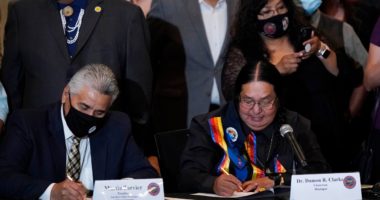
While the legalization of sports betting in Arizona might be the main reason for excitement, tribal casino operators have a broader view of their businesses. Tribal gaming expansion in new compacts includes much more than just wagering on sports.
As a result of the new agreements, Arizonians will see more casinos along with more slots and table games at existing facilities. While the new compacts largely uphold the financial terms of the previous contracts, the net result should be more revenue for everyone.
Details of tribal gaming expansion in Arizona
The most visible effects of the new agreements between the state and Indigenous peoples will be four new casinos. Two of them will be in the greater Phoenix area. The Gila River Indian Community has plans for one just south of Phoenix.
The other, to be developed by the Tohono O’odham Nation, will sit on the southeast corner of Loop 303 and Northern Pkwy. The Navajo Nation’s designs could include a new casino off Hwy 89 N in Flagstaff. The fourth property might be east of I-10 in Tucson and belong to the Pascua Yaqui Tribe.
Technically, the new compacts give a greater number of tribal groups the right to open new casinos across the state. The new statewide cap is 55, a drastic increase from the 25 that currently exist. However, plans only exist for the aforementioned four.
Another obvious change will be the volume of gaming positions at existing and new casinos. That starts with slots. The limit on the number of machines has expanded by about 6,300 across all gaming facilities in AZ. Every other year, they can pad that number by another 550.
In addition, casinos will be able to start offering several live dealer table games. Those include baccarat, craps, Pai Gao, roulette, and sic bo. Of course, retail sports betting will be an addition for 10 of the 16 tribal casino operators as well.
This is what tribal gaming interests got in a compromise with the state to consent to non-tribal entities offering gambling. The greater accessibility to a better variety of games has many optimistic about the compacts being win-win deals.
Everyone involved gets a cut
Some smaller tribes in the state did get a reprieve in their revenue-sharing agreements, cutting their rates from 1% of gross gaming revenue to just 0.75%. For the most part, though, those rates stayed the same. By and large, they range from a percent to 8%.
Despite the cuts for some compact-holders, AZ Gov. Doug Ducey’s office is optimistic that the net result will be a gain for the state. Tribal leaders are also looking forward to being able to offer the new types of gambling at their facilities.
“It’s about self-sufficiency and self-reliance,” said Navajo Nation President Jonathan Nez at a ceremony celebrating the new compacts.
The state has the right to re-negotiate the terms of the compacts after another decade. By then, the amount of additional revenue the additional properties, slots, and table games along with sports betting is bringing in for tribal casinos should have normalized.
For tribal casino operators, sports betting might be the least profitable of the new gaming forms. They can’t offer online wagering on tribal lands due to federal laws. The non-tribal licensees, like perhaps DraftKings Sportsbook and TPC Scottsdale, will power mobile betting in AZ.
Regulators in the state have yet to decide what tax rate those licensees will pay on their revenue. It’s possible that the state’s cut of that wagering activity could surpass its share of retail betting at tribal casinos, especially if the rate ends up being higher than 8%.
The new casinos and gaming positions should make for a bigger pie, which should make everyone’s slices bigger by default. For certain, the gambling industry in AZ is about to grow exponentially.







